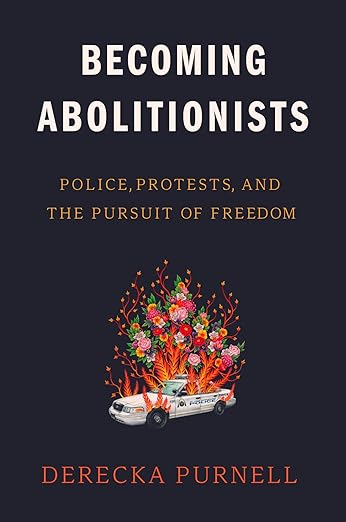
Becoming Abolitionists: Police, Protests, and the Pursuit of Freedom.

A Response to: Derecka Purnell. Astra House, 2022.
Reviewed by Charles Kiker
Derecka Purnell, native of St. Louis, is a young Black lawyer with a bachelor’s degree from the University of Missouri, Kansas City, and a JD from Harvard Law School. She is a regular contributor to The Guardian and numerous other publications. She is a Radical in the sense of getting to the root of things.
In Becoming Abolitionists she extensively treats of police killings, especially police killings of people of color, among them Trayvon Martin, Michael Brown, and George Floyd. The killer of Trayvon Martin was charged, indicted, and acquitted at trial. The killers of Michael Brown (and several others) never went to trial. Regarding George Floyd, the author notes:
In 2020, Minneapolis police officer Derek Chauvin pinned George Floyd to the concrete as he hollered that he could not breathe. Floyd screamed. He screamed for his mother. He screamed for his breath. For his life. Until he died nine minutes later. Calls for “justice” quickly ensued. I often wonder, What if the cop who killed George Floyd had kneeled on Floyd’s neck for eight minutes and forty-six seconds instead of nine minutes? Floyd would have lived to be arrested, prosecuted, and imprisoned for allegedly attempting to use a counterfeit twenty-dollar bill. Is that justice? I didn’t think so. Too often, the public calls for justice when Black people are killed by the police, and ignores the daily injustice if the victims live. (Page 3)
That’s radical. That gets to the root of the matter, and sets the stage for the 382 pages that follow!
Derek Chauvin was charged, indicted, convicted, and sentenced to prison. That’s a measure of retributive justice, but it does not bring back George Floyd. It does nothing to improve the contexts of George Floyd’s life and of where people of color live out of proportion to their population. It has not ended police killings, many of which the author mentions in her book, and some of which have occurred since its publication.
 After the George Floyd murder the United States Department of Justice undertook a study of the Minneapolis Police Department. In mid June, 2023 Attorney General Merrick Garland announced the results of that study. He began by complimenting the MPD as by and large a dedicated public service entity. But there’s always something beyond the “by and large.” The DOJ study called for corrections to the many threats to racial justice in MPD uncovered by the study. If MPD followed the recommendations to the letter, it would do nothing to improve the myriad other police departments in the US. It would do nothing to correct the injustice of the Memphis PD, where a recent egregious police killing of a black person occurred.
After the George Floyd murder the United States Department of Justice undertook a study of the Minneapolis Police Department. In mid June, 2023 Attorney General Merrick Garland announced the results of that study. He began by complimenting the MPD as by and large a dedicated public service entity. But there’s always something beyond the “by and large.” The DOJ study called for corrections to the many threats to racial justice in MPD uncovered by the study. If MPD followed the recommendations to the letter, it would do nothing to improve the myriad other police departments in the US. It would do nothing to correct the injustice of the Memphis PD, where a recent egregious police killing of a black person occurred.
The author warns of calling 911 in emergencies, especially for those living in disadvantaged neighborhoods. A 911 call may lead to police presence, which may lead to arrests due to a neglected traffic ticket, and sometimes to police violence. Calling 911 has never been a problem for me, but I do not live in a disadvantaged neighborhood.
Police killings and other prison-industrial-complex issues are prominent in this book, but a host of other issues are addressed, among them education, child welfare, genderism and sexual assault, flagism, borderism, ableism, and other isms.
For the author, reform of the police system cannot solve the problems. Only abolition can lead toward the creation of a new system which could aspire to become beneficial. The verb becoming is very important in the book title. The author makes clear in the final chapter that she is becoming. She makes clear that she has her path toward becoming, and that her path is in progress, and that readers may have another path. I am reminded of the opening petition in the oft repeated prayer. We ask for God’s reign on earth. That is a utopian vision. We live in varying degrees of dystopia.
My path toward the longed for and prayed for reign of God on earth is not the same as the author’s, and I thank her for acknowledging that we may have different paths. I have learned from her, and I would love to have coffee with her, and learn more. And I dare to dream that readers of this article might sit at that same table.
Charles Kiker is a retired ABCUSA minister. He earned a BA degree from Wayland Baptist College in Plainview, Texas, and BD and PhD degrees from Southern Baptist Theological Seminary in Louisville. He and his wife Patricia currently live in Arlington, TX, and are members of Broadway Baptist Church in Fort Worth.
Leave a Reply
You must be logged in to post a comment.


